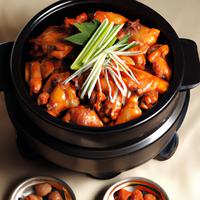
1 serving (300 grams) contains 250 calories, 30.0 grams of protein, 8.0 grams of fat, and 10.0 grams of carbohydrates.

Log this food in SnapCalorie

Nutrition Information
Calories |
196.9 | ||
|---|---|---|---|
% Daily Value* |
|||
| Total Fat | 6.3 g | 8% | |
| Saturated Fat | 1.6 g | 8% | |
| Polyunsaturated Fat | 0 g | ||
| Cholesterol | 63.0 mg | 21% | |
| Sodium | 629.9 mg | 27% | |
| Total Carbohydrates | 7.9 g | 2% | |
| Dietary Fiber | 0.8 g | 2% | |
| Sugars | 1.6 g | ||
| protein | 23.6 g | 47% | |
| Vitamin D | 0 mcg | 0% | |
| Calcium | 15.7 mg | 1% | |
| Iron | 1.6 mg | 8% | |
| Potassium | 236.2 mg | 5% | |
* Percent Daily Values are based on a 2,000 calorie diet. Your daily values may be higher or lower depending on your calorie needs.
Food Attributes
Source of Calories
About Korean ginseng chicken
Korean Ginseng Chicken, or Samgyetang, is a traditional South Korean soup renowned for its nourishing properties. This hearty dish features a whole young chicken stuffed with glutinous rice, garlic, jujube (red dates), and Korean ginseng, all simmered in a flavorful broth. Ginseng, long cherished in Korean culinary and medicinal practices, is believed to boost energy, strengthen immunity, and support overall vitality. The addition of garlic and jujube further enhances its health benefits with antioxidants and essential nutrients. Low in fat and high in protein, Samgyetang is often enjoyed during the summer months to combat fatigue and restore balance to the body. While the soup is nutrient-rich and wholesome, its sodium content can vary depending on preparation, making moderation important for those mindful of their salt intake. A comforting dish with deep cultural roots, it epitomizes the balance of flavor and health in traditional Korean cuisine.



